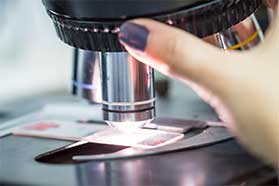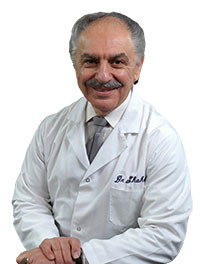Biopsy in Midland Park, NJ

When your body’s tissues change in abnormal ways, tumors can form. X-rays reveal a lot of what’s happening inside your body, but biopsy is a more exact method of discovering what’s causing your condition.
Biopsy is a procedure that removes samples of cells, tissue, or fluid from an abnormal area for laboratory testing. Your doctor can take a tissue sample from almost any part of your body, such as your breast, skin, or kidney. Biopsies are often done to test for cancer, but just because you’re having a biopsy doesn’t necessarily mean you have cancer.
A biopsy can help discover what’s causing your condition. To speak with a biopsy specialist in Midland Park today, call (201) 806-6099 or contact Dr. M.T. Shahab online.
Why Are Biopsies Done?
While imaging test may detect masses or abnormalities, they don’t tell your doctor whether masses are cancerous or benign. Biopsies can give detailed information that helps your doctor diagnose or rule out cancers.
Other conditions that a biopsy can check for include:
- ulcerative colitis
- kidney disease
- infections
- cirrhosis
- auto immune disorders
There are many different types of biopsies. Your healthcare provider can help you decide which type is best suited for your condition.
What Is A Needle Biopsy?
Needle biopsy is a common procedure that uses a needle to remove cells or fluid. It’s commonly used to examine tumors. You will most likely receive a local anesthetic to make the procedure painless.
There are several types of needle biopsies available, including:
- fine-needle aspiration: uses a long, thin needle to remove samples
- core needle biopsy: uses a larger needle with a cutting tip to collect a column of tissue
- vacuum-assisted biopsy: uses a suction device to increase the number of collected samples and reduce the number of needle injections
- image-guided biopsy: uses imaging like x-ray, computerized tomography (CT), magnetic resonance imaging (MRI), or ultrasound to guide your doctor’s biopsy
What Is A Skin Biopsy?
A skin biopsy, also known as a cutaneous biopsy, can diagnose skin cancers like melanoma. Types of skin biopsies include:
- shave biopsy: a razor-like device removes cells from your skin’s surface
- punch biopsy: a circular tool removes a column of cells from your skin’s deeper layers, leaving a small hole in your skin
- incisional biopsy: a scalpel removes a portion of your skin. May require stitches, depending on how much skin is removed
- excisional biopsy: a large area of tissue or entire abnormal area is removed. Usually requires stitches
Are There Other Types of Biopsies?
Other common types of biopsies include:
Endoscopic biopsy
This type uses a thin, flexible tube with a light on the end (endoscope). The scope is inserted into your mouth, rectum, urinary tract, or through a small incision in your skin to obtain tissue samples.
Endoscopic biopsies have specific names depending on where the biopsy is performed. For example, a cystoscopy collects tissue from your bladder. A colonoscopy biopsy uses an endoscope to collect tissue from your colon.
Surgical biopsy
This procedure involves your doctor making an incision in your skin. It’s generally performed while you’re under local or general anesthesia. This type of biopsy is typically done if past biopsies have been inconclusive or if other biopsy methods are unavailable.
Liquid biopsy
This newer, minimally invasive procedure tests your blood sample for cancer. Your healthcare provider collects a blood sample and examines it for evidence of DNA and cancer cells. This process is known as circulating tumor DNA (ctDNA) and circulating tumor cells (CTCs). Typically, ctDNA is looked for more often.1
While this procedure is less risky and may monitor cancer treatment success, research is ongoing. Ask your healthcare provider if liquid biopsy is right for you.
What Other Parts of The Body Can Be Biopsied?
Almost any body part can be biopsied. Some of the more commonly biopsied areas include:
- bone marrow: uses a needle inserted into the marrow to help diagnose bone cancer or to investigate blood abnormalities, including blood cancers like leukemia
- nerves: used to examine nerve damage from inflammatory nerve conditions
- lung or chest nodule: these can be done through an image-guided biopsy, an endoscopic biopsy, or a surgical biopsy to identify the cause of tumors, lung disease, fluid buildup, or lung inflammation; it can be done with a bronchoscopy (endoscopy of the lungs)
- muscle: performed with a needle or surgical biopsy to diagnose muscle defects and infections that affect muscle
- liver: a needle liver biopsy procedure is used to diagnose conditions like hepatitis C, cirrhosis, liver cancer, and to examine a transplanted liver for signs of transplant rejection
- kidney: an image-guided kidney biopsy is used to identify conditions like kidney failure, kidney inflammation, tumors, and to examine a transplanted kidney for signs of transplant rejection
- thyroid: an image-guided biopsy can identify the cause of abnormal tissue in the thyroid gland
- lymph nodes: a needle or surgical biopsy is used to identify the cause of enlarged or abnormal lymph nodes
- uterus: known as an endometrial biopsy, a uterus biopsy checks for the cause of abnormal uterine bleeding or for cancer
- testicles: a needle biopsy or surgical biopsy is used to diagnose the cause of male infertility or testicular cancer
When Can I Expect My Biopsy Results?
In certain cases—such as in a surgical biopsy—your sample can be examined immediately and results provided within minutes. More often, you’ll get results of your biopsy within 2-3 days, or 7-10 days if your results are complex.
Your recovery depends on which type of biopsy is performed. If you receive no anesthetic or a general anesthetic, you will be able to go home after the procedure. If you receive a general anesthetic, you may have to stay overnight. If you experience any pain after the procedure, you may be given prescription pain medication.
Reserve Your Appointment Now
Biopsy is a very common and reliable way to diagnose the cause of your tissue abnormality. To speak with a biopsy specialist today in Midland Park, call (201) 806-6099 or contact Dr. M.T. Shahab online.
- Domínguez-Vigil, Irma G. et al. “The Dawn of the Liquid Biopsy in the Fight against Cancer.” Oncotarget 9.2 (2018): 2912–2922. PMC. Web. 21 May 2018.
Medwell Orthopedics & Functional Medicine for Men & Women
Address
33 Central AveMidland Park, NJ 07432
(201) 806-6099
www.BergenCountyDoctors.com
Hours
Mon:
8:00 am - 8:00 pm
Tue:
2:00 pm - 7:00 pm
Wed:
8:00 am - 6:30 pm
Thu:
8:00 am - 1:00 pm
Fri:
8:00 am - 6:30 pm
Sat:
9:00 am - 1:00 pm
Sun:
By Appointment Only


